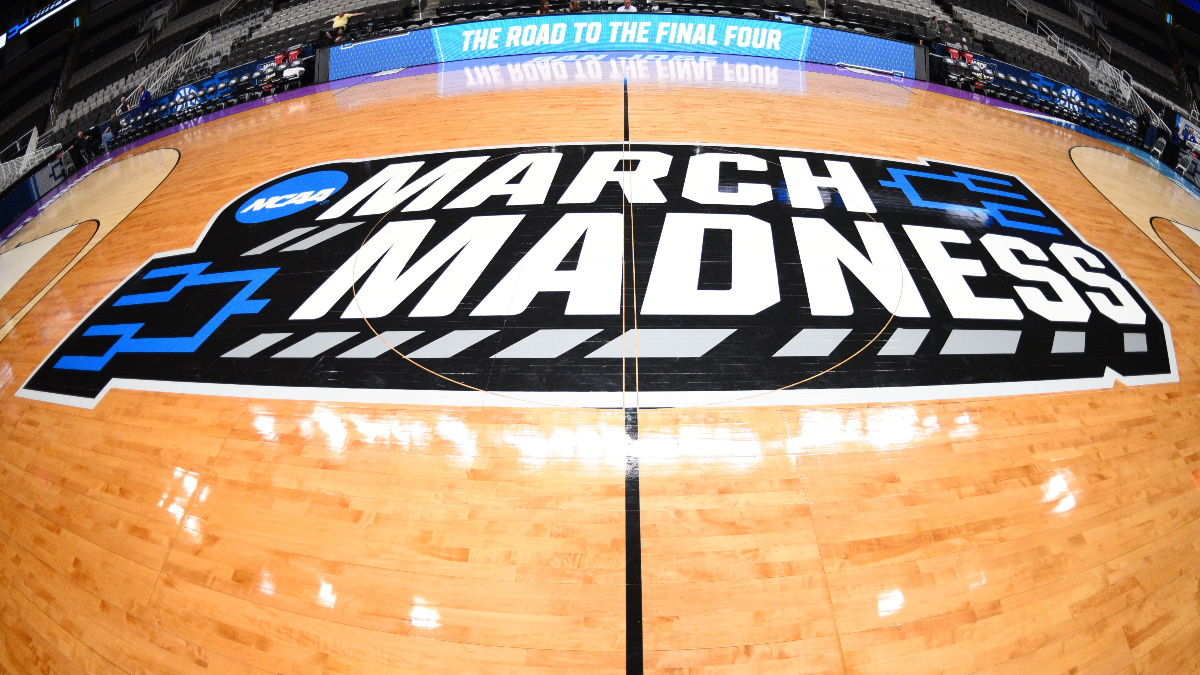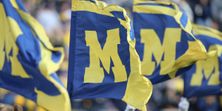New Jersey Introduces In-State Betting Bill For March Madness
Brian Rothmuller/Icon Sportswire via Getty Images. Pictured: The march madness logo on the court.
A day after their state was awarded a March Madness regional host site, New Jersey lawmakers are pushing a common-sense bill to allow in-state betting on the event.
State Senator Paul Sarlo announced legislation Thursday that would allow eligible New Jerseyans to bet on 2025 NCAA Men’s Basketball Tournament games to be played at the Prudential Center in Newark. One of the first states to take a legal sports bet outside Nevada, New Jersey still has some of the strictest regulations on college betting, including a ban on bets for NCAA events played within the state.
As announced, it appears the bill is still subject to the New Jersey constitution, which bans wagers on in-state collegiate sporting events and seems to require a constitutional amendment, not just an act of the legislature. If passed, the changes would also allow bets on a hypothetical college football bowl game at MetLife Stadium in East Rutherford.
“New Jersey has become the country’s biggest sports betting market, and the Meadowlands is the largest sports wagering facility in the state,” said Sen. Sarlo, whose district includes MetLife Stadium, in a statement. “This is an important opportunity we have to capitalize upon.”
“We need to support and sustain this growing market that is fast becoming a significant part of our regional and state economies,” Sarlo said. “March Madness is a high-profile event on the sports betting calendar and we should be a key player.”
New Jersey Considers March Madness Benefits
New Jersey officials spearheaded the legal challenges that ultimately led the Supreme Court to overturn the federal sports betting ban in May 2018. Since then, New Jersey has battled with Nevada for the nation’s largest state handles and accepted $749 million worth of bets in September 2020 alone, an all-time record for any jurisdiction in a single month.
These huge numbers have come without in-state college betting. Though college sports in New Jersey, with only a handful of high-profile Division I men’s basketball programs and Rutgers as its lone Power Five football member, are not as prominent in other markets, the prohibition has still hindered the legal market’s potential.
Forbidding bets on one of the nation’s marquee sporting events simply because its played within state lines could be even more consequential.
The three weeks of March Madness games are historically among the biggest of the year for sportsbooks. The American Gaming Association (AGA) projects Americans wager as much as $8.5 billion on the tournament annually.
An in-state ban on the 2025 East Regional could cost New Jersey legal sportsbooks millions of dollars in handle, money that would instead be wagered through offshore sites, unlicensed bookmakers or out-of-state.
"Eliminating the prohibition is a good step towards diminishing the power of the unregulated market," said J. Daniel Walsh, a lobbyist for legal gaming advocacy group iDEA Growth. "It’s a simple question for lawmakers: would they rather have people betting on March Madness with companies based in New Jersey, or companies out of the Caribbean?"
"If this doesn’t change, then New Jersey will potentially lose millions in revenues because people will have to go elsewhere to bet on high-profile NCAA games," Walsh said.
[Check out the best U.S. online sportsbooks here.]
Importance of Regulated College Sports Betting
While in-state college sports betting bans haven’t been a major issue in other early legal wagering adopters with few high-profile college sports programs such as Rhode Island and New Hampshire, industry stakeholders still fear its impact in other states. Gaming research firm Eilers & Krejcik estimates a blanket college sports betting can cost states with popular collegiate athletic programs as much as 50% of their handle.
“Prohibiting wagers on certain events or propositions simply forces consumers to seek options in the illegal betting market,” wrote Christopher Cylke, the AGA senior vice president of government relations, in a recent letter to Massachusetts lawmakers.
Officials from eight Massachusetts universities asked state legislators last month to keep college sports betting out of any legislation, arguing it creates “unnecessary and unacceptable risk to student-athletes.” Cylke countered in his letter dated Oct. 13, citing studies that showed a ban does little to protect athletes and can even have a negative impact.
“As we have seen across the country, legalized, regulated wagering on college sports is the best way to promote transparency and game integrity,” Cylke wrote.
Despite industry opposition during the legislative and rule making process, Virginia will become the most populated sports betting market with an in-state college sports betting ban when it goes live next year. The state’s most prominent athletic teams are University of Virginia men’s basketball and Virginia Tech football, neither of which will have their games offered by legal in-state sportsbooks.
Sen. Sarlo’s in-state NCAA tournament betting bill will likely do little to shift nationwide conversations as more states consider legal betting legislation, especially since the proposal makes no mention of removing prohibitions on games involving New Jersey teams.
Still, this is a step in toward greater viability in one of the nation’s highest-grossing markets, one industry stakeholders hope can lead to more beneficial regulations going forward.
How would you rate this article?

